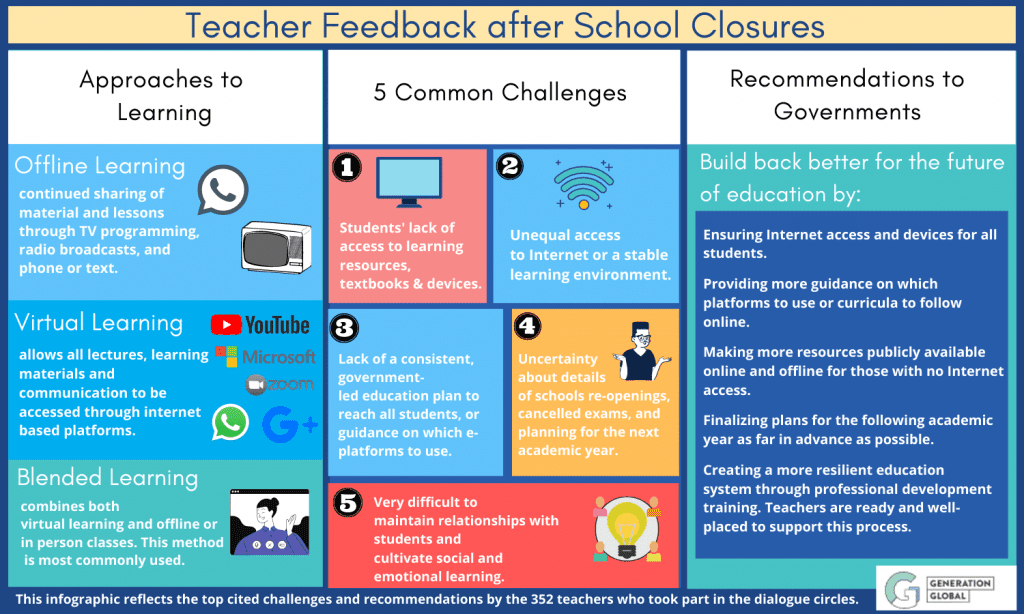By Xan Northcott

Xan Northcott is a Project Coordinator for Generation Global, the Tony Blair Institute’s global education programme seeking to equip teachers and students with 21st Century skills such as dialogue, critical thinking and open-mindedness. Previously he has worked to support youth political engagement, social entrepreneurship and climate action in the non-profit sector and within the United Nations system. He graduated Summa Cum Laude from New York University in politics and economics and joined the Tony Blair Institute in January of 2020.
COVID-19 is an educational crisis of a global nature never seen before. In just one month, 90% of all learners worldwide (more than 1.5 billion young people) saw their school or university close. A teacher in India, said: “Because the lockdown was sudden, many students don’t have stationery and no books. They are panicking. I feel the school buildings are closed but the staff is working more than ever to continue the teaching-learning process. After the shutdown, we were not equipped.”
This echoes the sentiments and challenges that confronted thousands of teachers around the world, as the pandemic spread faster than it was possible to form plans to address it. Many governments called for education to continue as far as possible, but the speed and uncertainty of the crisis made it extremely challenging for teachers to know exactly what they should do, with many facing remote teaching for the first time. Education ministries, school principals and teachers worked at an unprecedented pace to pioneer new educational approaches, however, in the ensuing global dialogue, the voices of teachers and students were missing from the debates, discussion and planning.
There was a need to bring teachers together from across the world to make sure their voices were heard during the crisis. This led to the concept of hosting ‘Dialogue Circles’, with the goal of creating open and welcoming spaces where teachers could share their experience of teaching during COVID-19, as well as useful tips for remote teaching and advice or recommendations for governments.
The teachers experienced huge relief at being able to converse with others facing similar challenges, describing the experience as making them feel “grateful”, “happy”, “calm” and “confident”. The below infographic summarizes the feedback from participating teachers from 19 countries:

COVID-19 is taking its toll on education – but teachers are creative and resilient
Some consistent themes emerged throughout, mostly concerning the incredible cost of COVID-19 on education, but also the innovation and hard work by teachers that is preventing this generation of youth from being left behind. The most successful remote teaching is taking place online, making use of various platforms ranging from Google and YouTube to innovative new online apps.
However, many teachers lack even the basic infrastructure to make this possible: a reliable internet connection, internet devices for all students, and a safe and calm home working environment. UNESCO data shows that in many countries less than 50 percent of schools have access to a computer, and correspondingly the OECD has reported that only half of students have been able to access all or most of the curriculum through remote learning materials during lockdown
Moreover, with most countries opting to prioritise transferring their exam-focused curricula to online settings, it is clear that holistic development and opportunities for social and emotional learning are frequently being lost. A UNESCO study has found that, “The mental health implications of the COVID 19 outbreak are far reaching”, with one survey in Thailand reporting that 70 percent of young people say the pandemic is affecting their mental health, causing stress, worry and anxiety.
Varying access to tech compounds inequalities
The variable access to tech across regions, or even within classes, has also compounded existing educational inequalities. Some teachers can reach further via government-supported radio or TV broadcasts, or sending assignments by SMS, but it is a significant challenge to adapt not only curriculums but also teaching style and methodology often with no additional time or prior training.
Positives from the pandemic
Despite these numerous challenges for teachers, the dialogue circles created an overwhelming sense of positivity and resolve. Regardless of the level of technology the teachers had access to, all teachers were finding ways to cope and were keen to share creative solutions or free resources they had discovered, and to learn from their colleagues across the globe. Some had seen positive developments, in particular embracing technology where previously there was skepticism, with some students adapting incredibly well to the online world. Others said that cancellation of exams is leading to a more holistic outlook on student assessment. Many said students and parents had developed a new appreciation for learning, education and teachers.
What teachers want to happen next
In addressing these challenges, teachers were pragmatic and creative in their suggestions to governments for making learning more resilient in future crises.
Our dialogue circles agreed that:
- Online access immediately takes remote learning to another level, and so efforts must be accelerated to ensure that every child has reliable access to a device with an internet connection.
- Where an internet connection is not possible, hard-copy and offline materials must be made available instead.
- Governments should have a succinct national plan for education during a crisis. There was total uncertainty at the beginning of the pandemic, and even now some countries are not clear on the plan for re-opening schools or the next academic year.
- There are many remote learning platforms and resources available, but much less guidance on which options work best in different contexts. Government guidance could help avoid teachers becoming overwhelmed or out of sync with other schools or classes.
- Education systems should be built to be more resilient for the future, including through teacher professional development.
Understanding the experiences and view of teachers and students will help governments ensure that the educational response to the pandemic is effective.



10 Responses
It keeps an educator updated. It strengthens our skills and knowledge further. Brings us to higher level and promotes professional development.
It keeps an educator updated. It strengthens our skills and knowledge further. Brings us to higher level and promotes professional development.
You are right !
Ideas you have shared will be helpful in the future of children .
You are right !
Ideas you have shared will be helpful in the future of children .
Really a very helpful article thanks for sharing and keep on sharing!
Really a very helpful article thanks for sharing and keep on sharing!
teachers feedback is really good, this shows that the teachers are also interested in teaching the students, the learning approaches are very nice , and difficulties they mention are also true, I think government will take some steps to solve the problem
teachers feedback is really good, this shows that the teachers are also interested in teaching the students, the learning approaches are very nice , and difficulties they mention are also true, I think government will take some steps to solve the problem
Thanks for sharing this!
Thanks for sharing this!